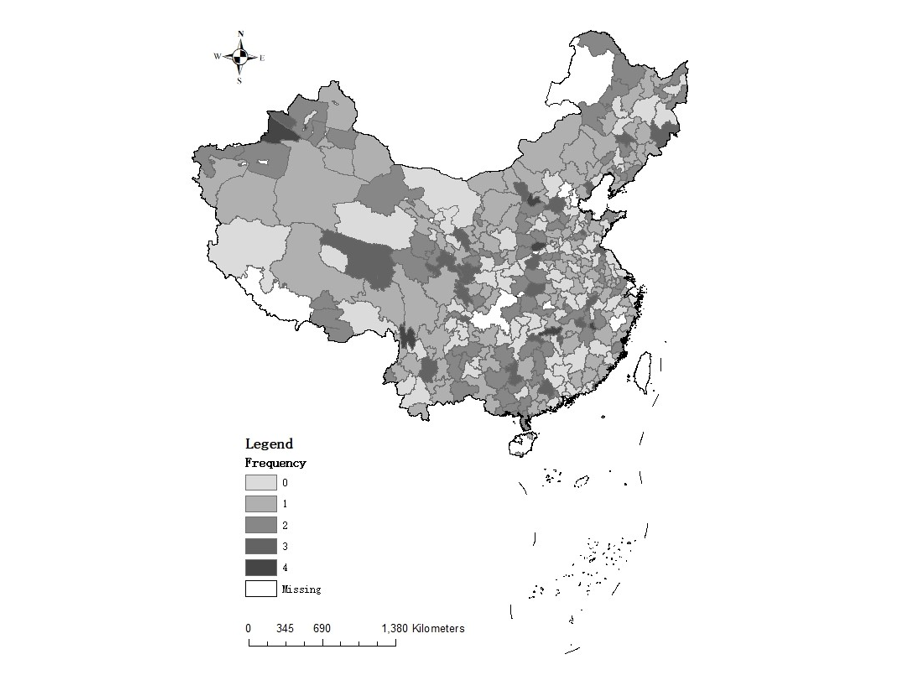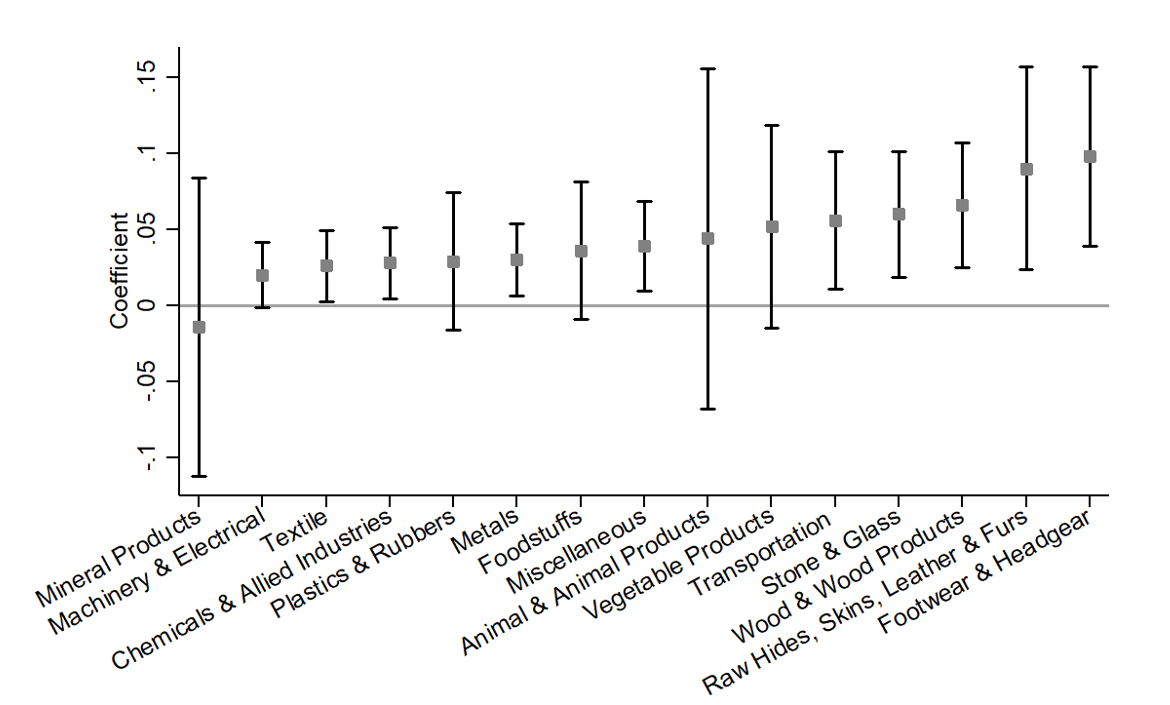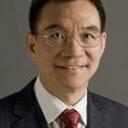
The rotation of local political leaders across cities in China facilitates the interregional diffusion of industry-specific knowledge and influences the realisation of local comparative advantage on international markets, potentially through the practice of industrial policy and familiarity with specific export markets.
The diffusion of knowledge and technology across regions serves as a crucial catalyst for economic development, in which the government can play an active role. Beyond the well-documented importance of migration in knowledge diffusion (Peri 2012, Bahar and Rapoport 2018, Bahar et al. 2024), in centralised political or bureaucratic systems like those in China and many other developing economies, the rotation of local government leaders across regions represents a unique form of personnel mobility. This rotation can significantly influence local policy formulation and economic development through the diffusion of tacit knowledge about production, management, governance, and market conditions. Our research (Lin et al. 2024), set within this context, investigates the impact of the rotation of political leaders on the diffusion of bureaucratic knowledge and the competitiveness of local industries in the export market.
The unique institutional characteristics in China provide a valuable opportunity for this investigation. To prevent the possibility that local officials form close ties with local elites and become unresponsive to central demands, the central leaders request that local officials be regularly transferred to equivalent positions in unfamiliar places. Leveraging this unique institutional setting, we explore bureaucrats' knowledge through the lens of industrial heterogeneity, and offer a new on-job perspective for understanding the capability of bureaucratic officials, which has long been a focus of research on economic development (Besley et al. 2011, 2022).
Our research primarily focuses on the rotation of party secretaries (PSs) of prefecture-level cities, the highest-ranking political leaders at the city level. On the one hand, city party secretaries have substantial discretion in determining their cities' local development strategies and industrial trajectories (Joseph 2019). On the other, these local leaders are regularly rotated across regions under the rotation arrangement. The rotations enable officials to acquire industry-specific knowledge from their experiences, which can be used locally in their new positions to shape industrial competitiveness through the practice of industrial policy.
Empirical methods and key findings
To explore the impact of political rotation on transmitting bureaucrats’ knowledge, we look at how new appointments correlate with a city’s ability to export the products that the incoming political leader’s previous city specialised in. This captures the extent to which Chinese bureaucrats bring the knowledge gained in their previous positions and apply it to their new role. Based on the CCER Officials Dataset collected by the China Center for Economic Research (Yao et al. 2020) and China Customs Database, we construct a unique and comprehensive dataset that links the industry-specific export performance of Chinese cities with detailed information on the resumes of prefectural leaders and their biographic records from 1997 to 2012. Moreover, we exploit changes in cities’ export baskets—as captured by the revealed comparative advantage (RCA), which compares the ratio of a city's exports in a specific industry to its total exports against the same ratio nationally and measures where a city outperforms the national average—to capture the diffusion and localisation of industry-specific knowledge. Figure 1 plots the number of city party secretaries whose last positions were in other prefectures during 1997-2012.
Figure 1: Frequency of political rotation of city party secretaries across regions

We document robust evidence that the arrival of a party secretary from a significant city exporter of a given industry is associated with up to a 4.1% annual increase in the city’s comparative advantage in the same industry during the secretary’s tenure. This impact is equivalent to a 4% increase in foreign direct investment (FDI) in the same prefecture-industry cell. These findings suggest that political rotations catalyse the diffusion of knowledge and experience, which significantly influences regional industry-specific productivity. Furthermore, this effect is significant in most manufacturing sectors, with the several sectors with muted effects mainly producing primary goods and depending more on natural resources (Figure 2).
Heterogeneity analyses help derive more concrete policy implications. The effect of political rotation is stronger among rotated officials who are younger, higher educated, and pursued engineering or social science majors during their college education. In addition, the effect of leader rotation is particularly prominent for sectors relying heavily on contract enforcement and less-developed cities with limited input and output market access.
Figure 2: The effect of political rotation by sector

Notes: We regress city-industry-year level RCA on the indicator for party secretary transfer shocks for each of the 15 sectoral groups. The coefficients represent the magnitudes of the estimated effects of political rotation on RCA. This figure plots the estimated coefficients with 95% confidence intervals for subsamples of 15 sectoral groups.
What are the mechanisms driving the impact of political rotation on local comparative advantage?
Our study suggests two potential mechanisms that tend to play a role: the implementation of industrial policy and the practice of knowledge on international markets. We also discuss alternative explanations.
1. The implementation of industrial policy
Utilising a unique and extensive dataset comprising the city-level annual government work reports, and leveraging a machine-learning method for textual analysis, we construct a measure of city-level industrial policy that captures the extent to which the policy descriptions reflect an intention to promote specific sectors. The regression results show that the likelihood of a city implementing policies favouring specialised sectors in cities where the political leaders had their previous terms is 3.8 percentage points higher than other sectors. Furthermore, the newly rotated leaders likely support upstream and downstream sectors closely connected to those with an RCA where they had served. To the best of our knowledge, our work represents the first comprehensive study on the determinants of city-year-sector-level industrial policies from the perspective of local leaders’ experience.
2. The practice of market knowledge
The change in local RCA following the appointment of a new city PS might also work through the rotated leader's transmission of information on market conditions. Indeed, we show that political rotation significantly improves a city's relative ability to export to destinations where the leader's previous workplace was a significant exporter. In particular, the rotation leads to more entry of exporting firms, products, and even industries into destinations with which the new leaders are familiar.
3. Alternative explanations
We further explore alternative potential mechanisms, including policy imitation across regions and investment flows via social connections between political leaders and entrepreneurs. The results suggest that these mechanisms play a less significant role in driving our primary findings. Meanwhile, we find that the positive impact after the rotation is not accompanied by a significant reduction in exports of other industries in the same city or of other cities in the same industry. Thus, we tend to conceive the economic impact of political rotation not as a zero-sum game but as diffusing knowledge across regions and bringing about industrial development for the local economy that helps reduce regional inequality.
Policy implications
The findings of this study hold significant implications for the design and implementation of policies related to the appointment of local government leaders, especially in countries with centralised political systems like China. Our study highlights the economic importance of political rotation, illuminating how bureaucrats' industry-specific knowledge is acquired, disseminated, and localised across regions from a perspective of industry-specific knowledge. The findings suggest the need for dynamism and initiative in appointing well-educated leaders with specific industry development experiences to decision-making positions. This need arises not only because bureaucrats' knowledge affects bureaucratic capacity and economic development, but also because knowledge sharing and conversion are key instruments in reducing regional inequality within a country.
Furthermore, our study underscores the role of industrial policy implementation as a mechanism for the effects of political rotation on industry-specific productivity. Policymakers should focus not only on appointing knowledgeable and experienced leaders but also on developing and implementing industrial policies that can effectively utilise bureaucrats' knowledge and experience for economic development.
References
Bahar, D, A Hauptmann, C Özgüzel, and H Rapoport (2024), "Migration and knowledge diffusion: The effect of returning refugees on export performance in the former Yugoslavia", Review of Economics and Statistics, 1-18.
Bahar, D and H Rapoport (2018), "Migration, knowledge diffusion and the comparative advantage of nations", Economic Journal, 128(612): F273-F305.
Besley, T, J G Montalvo, and M Reynal-Querol (2011), "Do educated leaders matter?", Economic Journal, 121(554): F205–F227.
Besley, T, R Burgess, A Khan, and G Xu (2022), "Bureaucracy and development", Annual Review of Economics, 14: 397–424.
Joseph, W A (2019), Politics in China: An introduction, Oxford University Press.
Lin, J Y, S Liu, M Xu, and H Zhang (2024), "Learn in Order to Practice: The effect of political rotation on local comparative advantage in China", Working paper.
Peri, G (2012), "The effect of immigration on productivity: Evidence from US states", Review of Economics and Statistics, 94(1): 348-358.
Yao, Y, L Li, T Xi, H Wang, F Wan, Q Zhang, S Liu, and S Zhang (2020), "Selection, training and incentivizing: Evidence from the CCER Officials Dataset", China Economic Quarterly, 19(3): 1014–1040.




